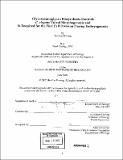Glycosaminoglycan biosynthesis controls C. elegans vulval morphogenesis and is required for the first cell division during embryogenesis
Author(s)
Hwang, Ho-Yon, 1969-
DownloadFull printable version (9.505Mb)
Alternative title
Glycosaminoglycan biosynthesis controls Caenorhabditis elegans vulval morphogenesis and is required for the first cell division during embryogenesis
Other Contributors
Massachusetts Institute of Technology. Dept. of Biology.
Advisor
H. Robert Horvitz.
Terms of use
Metadata
Show full item recordAbstract
Morphogenesis is critical to the development of multicellular organisms. Morphogenesis is also a complex process that requires the coordination of many events, including cell division, cytoskeletal reorganization, cell-cell and cell-matrix interactions. To investigate a driving mechanism of morphogenesis in organ formation, we characterized a group of C. elegans mutants defective in vulval morphogenesis. We established that the morphogenetic defect is caused by disruption in biosynthesis of chondroitin glycosaminoglycans by molecular identification and characterization of five sqv (uashed vulva) genes. Glycosaminoglycans are known to function in development by binding a large repertoire of ligands involved in morphogenesis and wound healing, in some cases by modulating certain conserved signaling pathways, and in providing structural support in the extracellular matrix. Defects in biosynthesis of glycosaminoglycans can cause connective tissue diseases. We found that regulation of sqv-4 likely controls glycosaminoglycan biosynthesis and the aspect of vulval morphogenesis driven by chondroitin. We also characterized specific defects in separation of the plasma membrane from the eggshell and failure to initiate cytokinesis caused by mutations in sqv genes in the one-cell embryo.
Description
Thesis (Ph. D.)--Massachusetts Institute of Technology, Dept. of Biology, 2002. Includes bibliographical references.
Date issued
2002Department
Massachusetts Institute of Technology. Department of BiologyPublisher
Massachusetts Institute of Technology
Keywords
Biology.